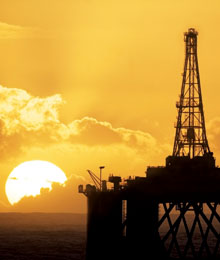BP Oil Spill: A Crude Conundrum
August 4, 2010 by Simona Panetta
Filed under lifestyle, Special Features
 A manmade disaster of catastrophic proportions gushed through the Gulf of Mexico two days before Earth Day this year. Millions of gallons of poison surged from the seafloor, swimming throughout the world’s ninth largest body of water. The Gulf laps onto the shores of Florida, Texas, Alabama, Mississippi, Louisiana – states still fragile from the destructive aftermaths of Hurricanes Katrina and Rita.
A manmade disaster of catastrophic proportions gushed through the Gulf of Mexico two days before Earth Day this year. Millions of gallons of poison surged from the seafloor, swimming throughout the world’s ninth largest body of water. The Gulf laps onto the shores of Florida, Texas, Alabama, Mississippi, Louisiana – states still fragile from the destructive aftermaths of Hurricanes Katrina and Rita.
As flames licked the BP oil rig, a haunting déjà vu unfolded, eclipsing the Exxon Valdez disaster in size and depth and bringing a 40-year-old environmental movement to its trembling knees.
“The world should raise its eyebrows and say, ‘enough of this,’” says Dave Rauschkolb, who believes that many of the world’s problems are tied to our dependence on oil and prehistoric energy policies. A regular Joe and environmental prophet, if you will, Rauschkolb masterminded Hands Across the Sand, a poignant, divergent gathering of concerned citizens determined to save the environment from further damage.
“The world has to embrace clean energy and America has to lead the way,” says Raushkolb, who joined thousands of people holding hands along Florida’s beaches to protest offshore-oil drilling – two months before the BP-leased Deepwater Horizon rig exploded. Shortly after that, Hands Across the Sand went national.
In its infant stage, the BP spill is said to have created globs the size of small states and underwater plumes that stretched for up to 10 miles. It has a poisonous trajectory, sucking the life from the livelihoods and legacies of fishermen and locals, wildlife and fish. “I was in Pensacola on a boat trip and I saw large quantities of oil in the water,” says Rauschkolb, a Floridian surfer and restaurant owner. “We’re all fortunate that the tide and wind have steered the oil away from us but that doesn’t escape the fact that our entire coastal economy has been threatened.”
Thirty-eight countries outside of the U.S. are now supporting Rauschkolb’s movement. In June of this year, 28 events took place across Canada.
As the Gulf chokes from toxicity and lack of oxygen, who and what is to blame but the shortcomings of humans all around the world, who continue to preach perfection while high on their addiction to oil? “BP has had major safety problems over the last few years and seems to have a culture on cost-cutting safety. But I don’t think this situation is all because of BP. There’s always going to be a bad actor out there … but it’s not enough to just punish the individuals involved,” warns author and award-winning journalist Charles Wohlforth.
The antagonist is BP’s CEO Tony Hayward. In October, he will be replaced by Robert Dudley and receive a year’s salary (US$1.6 million) in lieu of notice. BP has plans to nominate him for the position of non-executive director of TNK-BP, a Russian joint venture. “The Gulf of Mexico explosion was a terrible tragedy for which – as the man in charge of BP when it happened – I will always feel a deep responsibility, regardless of where the blame is ultimately found to lie,” said Hayward in a statement.
Nicknamed “Toxic Tony,” filleted and fricasseed by media and on the stand, Hayward sparked a storm of anger with his “I want my life back” comment and his attendance at a yacht race as a crude reality swept across the Gulf.
When President Obama spoke in June about the spill, he announced that the global energy company is responsible for a $20-billion compensation fund for Gulf residents and businesses. “The millions of gallons of oil that have spilled into the Gulf of Mexico are more like an epidemic, one that we will be fighting for months and even years,” Obama said. Some critics believe that BP’s “corporate arrogance” will leave the people affected in the Gulf in its rearview mirror.
A BP representative says it’s impossible to quantify how much oil was released when the oil rig exploded, with the latest estimate of daily flow rate between 35,000 and 65,000 barrels a day. Before a cap was set in place, 826,800 barrels of oil was collected.
When extremely multifaceted operations occur in the deep ocean, accidents will most likely occur, testing humans and technology. No one is perfect; this is our kismet. “There’s this simple chain: all technology is human activity. Humans are fallible so technology will always fail,” says Wohlforth, who witnessed the devastation in Prince William Sound in Alaska after the Exxon Valdez disaster in 1989. “The oil is still smeared on my notebook and it never came off my boots. Or off my heart,” he wrote in his book The Fate of Nature: Rediscovering our Ability to Rescue the Earth. He believes that social movements will flourish if we connect as a community and better our relationship with the environment.
Exxon claims that there was no long-term damage caused by the oil spill but according to Wohlforth, only seven to eight per cent of the spill in Alaska was recovered, and somewhere between 10 to 15 per cent can be from the oil leaking out of the well in the Gulf.
With a concentrated effort, led by the experienced Admiral Thad Allen and thousands of personnel, President Obama describes the Gulf clean-up as the largest in U.S. history, with hopes of capturing up to 90 per cent of the oil swirling in the Gulf of Mexico. Some say this is unattainable. “I don’t think it’s physically possible to capture a large percentage of the oil … it’s much more difficult to recover because the oil is spreading over such a large area,” says Wohlforth.
While BP rightfully embodies the proverbial scapegoat, our morals should cause hesitation as we wash our hands clean of this mess. “Humanity has a terrible track record. It’s not about being Liberals or Conservatives or Democrats or Republicans. This is an issue where people can come together,” says Rauschkolb. “We’ve opened up a Pandora’s Box … every time we plug a hole in the ground and pull this black poisonous stuff out and use it for whatever it is that we use it for, we’re endangering our environment and we’re endangering ourselves.”
The Canada-Nova Scotia Petroleum Board is currently regulating two offshore drilling projects in the Atlantic – The Sable Offshore Energy Project based in Halifax, Nova Scotia and operated by Exxon Mobil and partners, and the Deep Panuke Offshore Gas Development Project occurring southeast of Halifax and operated by EnCana Corporation and partners, says the National Energy Board (NEB). According to the Canada-Newfoundland and Labrador Offshore Petroleum Board, there is offshore drilling in Newfoundland. The Lona-055, located in the Orphan Basin off the coast of Newfoundland, is deeper than the BP well in the Gulf.
Other vast, pristine waters may be the next location, as oil companies cast their gaze on Arctic waters. The NEB says that currently there is no application for Arctic drilling. Moratoriums are in place, but that can all change in 2014. If we can’t handle the spill in the Gulf, how could we handle a disaster just like it in the icy, harsh conditions of the Arctic?
“Every major region that has had significant drilling activity has experienced a major spill,” says Ian Bruce, team lead of the David Suzuki Foundation’s Climate Change and Clean Energy Program. “There are many causes, from human error to lack of government oversight, to mechanical failures. I think the real enemy is the status quo. Our dependency on fossil fuels is the real culprit in this major problem,” says Bruce.
“The world should raise its eyebrows and say, ‘enough of this.’” — Dave Rauschkolb
Hayward and BP blundered, but so does a government’s ignorance and the public who enjoys the oil that is pumped from the ground, shipped by a tanker across the water to an oil refinery where it is converted into fuel for your car, electricity for your home and into products like hair conditioner and detergent.
According to the NEB, in 2009, Ontario consumed roughly 322,000 barrels per day of crude oil. The total value of crude oil consumption in Canada for 2009 is estimated at $41.3 billion dollars. While we won’t be able to nix our need for oil overnight, some environmentalists claim that if we start somewhere, Canada can embark on a fossil-fuel free revolution within a generation’s time. Unfortunate occurrences can ignite change – The Environmental Protection Agency and Earth Day sprang forth after the Santa Barbara oil spill overwhelmed southern California in 1969. “Oil is a drug that we can’t afford to be addicted to,” says John Bennett, executive director of Sierra Club Ontario, a grassroots organization dedicated to protecting and restoring the environment. “We’ve been at war with the planet and we’re winning … but we are going to lose because when we win the fight we will destroy the planet.”
When censure of BP ensued after the spill, which President Obama calls “the worst environmental disaster America has ever faced,” we all wondered: was it a case of misconduct, a mechanical failure, the U.S. regulatory system that may have showed leniency on BP? But did we ever consider that the greatest threat for the environment is human inaction? “We may indeed end up consuming the entire biosphere and turning our world into a food-making, energy-making machine but it’s not inevitable and we really do have the ability and the urge to live a different way,” says Wohlforth. Fool me once, shame on you. Fool me twice, shame on me.
www.handsacrossthesand.com
sierraclub.on.ca
www.davidsuzuki.org
www.fateofnature.com
www.bp.com












Truer words were never spoken.
It is my understanding that the oil rigs in europe are required to have a shut off valve installed. If America were to adopt that policy as law, we would at least be taking a step in the right direction…Although, ridding ourselves of our dependency on oil is the the ultimate goal.